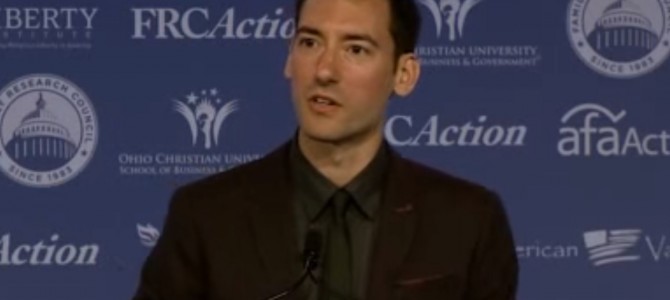
A Houston grand jury has concluded there’s not enough evidence to bring Planned Parenthood Gulf Coast to trial from the series of videos David Daleiden of the Center for Medical Progress produced this last summer. It did, however, indict Daleiden on two charges, a felony charge of tampering with a governmental record (another employee, Sandra Merritt, was indicted on this charge as well) and a misdemeanor count related to purchasing organs.
While the case still needs to go to trial and certainly an indictment doesn’t mean Daleiden is guilty—remember, the grand jury only had to feel there was enough evidence against him to proceed—the fact that Planned Parenthood was cleared while Daleiden was not speaks volumes about our culture’s twisted sense of what is legally and morally right.
If David Daleiden Were Hillary Clinton
The legal implications of Planned Parenthood walking away scot-free while Daleiden and Merritt must go to trial are several, but time is limited. For now, a quick comparison to demonstrate the twisted “logic” our country finds itself inside regarding one of the biggest culture wars we have faced in recent memory, and one that helps show the depth to which our morality has plunged.
In the last six months, Hillary Clinton, the Democratic nominee for president, has been under tremendous scrutiny for hosting classified e-mails on her private, unsecured server. Every mainstream news outlet, including this one, has covered this in detail. Last fall, Clinton endured a day-long hearing, where she was pummeled with questions.
Her actions were illegal and unethical. It likely cost American lives, money, security, and time. Yet Clinton remains under a quasi-FBI investigation conducted without the aid of the Justice Department or, you guessed it, even a grand jury. Everyone from Dick Morris to Donald Trump to a former U.S. attorney says she should have been, or will be, indicted. Yet this hasn’t happened.
Of course, Clinton and Daleiden’s case specifics are as different as night and day, but both are inherently political and high-profile. The former is a love-affair of politics, complexities, and intrigue: So what if an old woman sent some e-mails on the wrong computer? She’s a Clinton. The latter is a perceived attack on the very fabric of our autonomous, independent selves. So what if Planned Parenthood was selling body parts? Truth-tellers be dammed; abortion and its mother ship must remain untouched.
The cases may be on opposite ends of the spectrum, but they meet in the core of our country’s deepest complexities: How much do we want to know about what we don’t know? Did we, in our ignorance, commit any wrongdoing?
Our Gruesomely Self-Centered Culture
Pro-life advocates have often referred to abortion darkly as the “culture of death,” and while that certainly captures the letter of the law, it fails to recognize its spirit. While it has conclusively produced millions of dead babies, the spirit of Roe v. Wade arises from a culture of selfishness. The free love of the ’60s produced babies that would interfere with the free-wheeling spirit that had spawned them in the first place. Abortion is as much about killing a baby as it is about choosing one’s self and one’s plans over which said baby (supposedly) interferes.
Of course, the grand jury would say that they, in accordance with their oath, scrutinized merely the legal merits of the case, but we live in a world 40-plus years after Roe v. Wade, and the members of the grand jury must view a case about abortion through the lens of people steeped in that culture just as a car mechanic would shop for a new car. Abortion has so pervaded society now that hardly anyone remains untouched—friend, colleague, spouse, boyfriend—from its moral implications, and it’s unlikely the members of this grand jury remained disaffected.
In their eyes, somehow, despite 30-plus hours of videos exposing Planned Parenthood stripping babies of their right to life, then their organs, then revealing plans to sell them for profit, their worldview framed this to seem perfectly legal. It only makes sense, then, that people living in a culture steeped in preserving their own plans, their own autonomy, their own happiness would remain blind to what lay in the glow of the light—facts blatantly before them in the form of tiny fingers, slivers of liver, the smallest of hearts, Lamborghinis, prices of sale—and instead cast doubt, blame, and ultimately guilt on the people casting the glare.
If Planned Parenthood Is Guilty, So Are We
Daleiden is found at fault not necessarily because he is guilty—a jury must make that decision during trial—but because if this grand jury had decided Planned Parenthood was guilty, they would recognize Planned Parenthood violates our smallest, most defenseless of human beings at their most vulnerable stage of life. If that’s true, Planned Parenthood could come crashing down and, with it, the puppeteer Roe v. Wade could also weaken.
Time and a trial will tell what lies ahead for Daleiden and Merritt. What’s certain is when our country places a higher priority on politics—Clinton or abortion—versus people—our soldiers or our babies—it’s a sign our moral thermostat is cooling to temperatures well below comfortable. The lower it goes, the harder it will be to raise it back to a level of awareness that recognizes even the smallest members of our society with dignity and respect.
As William Wilberforce, the great abolitionist of the slave trade said, “Selfishness is one of the principal fruits of the corruption of human nature; and it is obvious that selfishness disposes us to over-rate our good qualities, and to overlook or extenuate our defects.”









